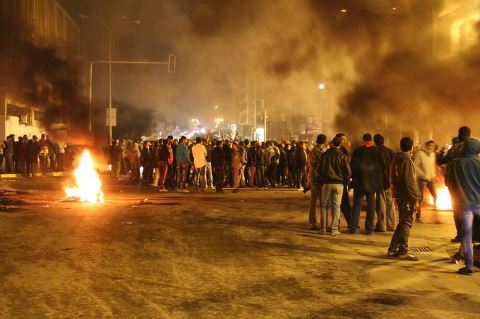By Maha Ellawati.

Benghazi, 27 November:
Angry demonstrators flooded onto the streets in front of the Commercial Bank in Al-Baida last night, burning . . .[restrict]tyres and demanding the creation of a federalist state in Libya.
They were subsequently joined by federalists in Benghazi who staged their own protest in front of the Tibesti Hotel.
Chanting slogans such as “Oh young people of Baida, say yes to federalism and no to slavery”, the crowd also denounced the recent announcement by National Congress President Mohamed Magarief of a $200 million development package to Tunisia.
In fact, the deal was agreed to by the National Transitional Council, around the time that Tunisia agreed to extradite former Prime Minister Baghdadi Al-Mahmoudi. Under the agreement, $100 million has been advanced to Tunisia as a loan, with the remaining $100 million a gift.
Fires were lit at four different locations as demonstrators closed down the main street of the town, which is also home to former NTC Chairman Mustafa Abdul Jalil.
Members of the crowd complained of poor conditions experienced by Libyans in Baida and elsewhere in the country and criticising the decision to channel needed funds to other states.
Having heard about the Baida demonstration, dozens of Benghazi residents came onto the streets demanding a federalist state in Cyrenaica, likewise blocking roads and setting tyres ablaze.
“Libya’s wealth must be protected and we must fight against corruption”, said one man. “We are tired of being marginalised; there is a devastating situation being experienced by eastern cities because of this marginalisation.
In Benghazi, as in Baida, the old Cyrenaican flag was flown, a black banner with white start and crescent. The NOC’s decision last month to suspend a planned move of the company to the eastern city was also amongst the protesters’ grievances.
Under the proposal, the currently inconsequential Benghazi branch of the NOC would have been given effective control over the oil sector in eastern Libya, where some 80 per cent of the country’s oil wealth is located. The plan was suspended less than a week after its announcement, however, following heated protests from NOC workers in Tripoli. Officials at the company say the decision will now rest in the hands of the new government of Ali Zeidan.
As the protests continued, demonstrators moved onto a different theme, echoing a widespread sentiment that Qatar, one of the strongest supporters of last year’s uprising, was exercising too much influence in the country. “No to Qatar’s agenda, Libya is a free and independent state”, chanted one group of demonstrators.
This month saw the publication of an highly controversial new book by UN Ambassador Abdurrahman Shalgam. In the book “The End of Qaddafi”, Shalgham claimed that Qatari officials bragged of “beautiful nights” spent in the company of Libyan girls during last year’s revolution.
The diplomat, who made worldwide headlines in February 2011 when he publicly denounced Muammar Qaddafi before the UN in New York, also accused Qatar of ruthlessly pursuing “concealed” interests in Libya, stealing remnants of biological weapons from abandoned military sites, and attempting to further its own ideological agenda.
“Oil carries in it the virus of megalomania and the bacteria of delusion”, writes the ambassador, in a thinly-veiled warning to the oil-rich emirate, “which is what occurred under Qaddafi”.
The book has sparked fury amongst women’s rights groups in Libya, prompting calls for Shalgham’s immediate dismissal on the grounds of gross disrespect shown to Libyan women.
The Justice and Construction Party (JCP) has also issued a statement calling for Shalgham to be summoned for questioning over his allegations, whilst the Wattan party has demanded he be hauled before the Integrity Commission.
[/restrict]







